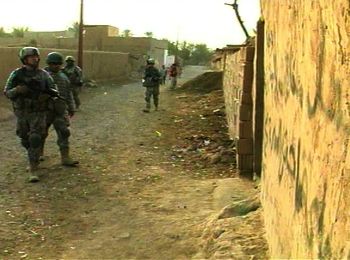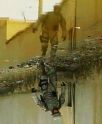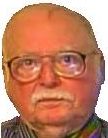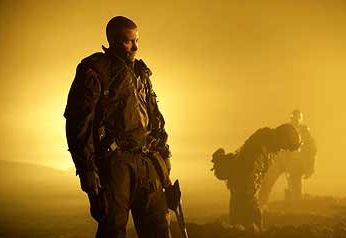
Publisher:
Bonnie King
CONTACT:
Newsroom@Salem-news.com
Advertising:
Adsales@Salem-news.com

~Truth~
~Justice~
~Peace~
TJP
Nov-13-2008 07:26

 TweetFollow @OregonNews
TweetFollow @OregonNews
West Coast Doctors Square Off Over PTSD Therapy
Tim King Salem-News.comA combat veteran-turned-physician who treated PTSD victims for years, trades verbal blows with the psychologist pioneering virtual reality therapy for PTSD.
 American soldiers patrol a village in Iraq. Soldiers and Marines are increasingly developing PTSD from exposure to combat, and two experts strongly disagree over treatment methods involving virtual reality therapy. Photo by Tim King Salem-News.com |
(SALEM, Ore.) - Two west coast doctors, a psychiatrist and a retired osteopath, are lobbing shots at one another over how to treat combat vets who suffer from combat-related stress. Their starkly different opinions on treatment reflect the enormity of problems associated with Post Traumatic Stress Disorder, or PTSD.
 Hundreds of thousands of Americans have been exposed to combat in both Iraq and Afghanistan. Many who served witnessed horrific scenes on the battlefield and are scarred emotionally as well as physically. The resulting problem is called PTSD.
Hundreds of thousands of Americans have been exposed to combat in both Iraq and Afghanistan. Many who served witnessed horrific scenes on the battlefield and are scarred emotionally as well as physically. The resulting problem is called PTSD.
It seems fair that controversy would accompany such a serious problem and it does on several levels. Approaches to PTSD treatment vary considerably, and many cases remain undetected as career soldiers and Marines risk promotion and advancement opportunities if they reveal their mental stress to their commands, in search of treatment.
'Horribly unfair' may begin to describe a system that inflicts mental stress then punishes a person who seeks help, but unfortunately that is how things are. Perhaps these difficult circumstances explain, in part, why Dr. Phil Leveque of Oregon and Dr. Albert 'Skip' Rizzo of Southern California have had several terse exchanges already, and plan to debate their differences this January when Rizzo visits Fort Lewis, Washington.
Dr. Phillip Leveque
 Dr. Phillip Leveque served in Patton's Army during WWII, surviving months of combat as U.S. forces brought about the end of Adolph Hitler's Nazi Germany.
Dr. Phillip Leveque served in Patton's Army during WWII, surviving months of combat as U.S. forces brought about the end of Adolph Hitler's Nazi Germany.
After the war, Leveque attended the Oregon Medical School, receiving his Ph.D. in Pharmacology and Toxicology in 1954. He became an instructor at the Medical School and an instructor and assistant professor at the Oregon Dental School, and then took a position with the Medical College of Georgia.
He was invited by the University of London to teach in Africa, eventually working in Uganda and Tanzania, where he helped train those nations' first doctors. Two decades later, Dr. Leveque returned to Oregon and set up a private practice in the city of Molalla, where he worked with chronic pain sufferers, among them approximately 400 Vietnam veterans suffering from PTSD.
Dr. Leveque has been one of the leading voices behind Oregon's highly successful Medical Marijuana Program, and he sees the herb as a potentially preferable PTSD treatment over morphine-based drugs that are largely prescribed to vets by the Veterans Administration. He says alcoholism is another problem for PTSD sufferers, and again cites the usefulness of marijuana as a less-damaging alternative. He says his beliefs are reinforced up by hundreds of his former patients who use medical marijuana on a regular basis. Today he writes regularly for Salem-News.com and also records question and answer video segments on medical marijuana and PTSD.
Dr. Albert "Skip" Rizzo
 Albert "Skip" Rizzo received his Ph.D. in Clinical Psychology from the State University of New York at Binghamton. He is a Research Scientist at the University of Southern California Institute for Creative Technologies and has a faculty appointment with the USC School of Gerontology.
Albert "Skip" Rizzo received his Ph.D. in Clinical Psychology from the State University of New York at Binghamton. He is a Research Scientist at the University of Southern California Institute for Creative Technologies and has a faculty appointment with the USC School of Gerontology.
Dr. Rizzo conducts research on the design, development and evaluation of Virtual Reality systems targeting the areas of clinical assessment, treatment and rehabilitation. This work spans the domains of cognitive, motor and psychological functioning in both healthy and clinical populations. His cognitive work has addressed the use of VR applications to test and train attention, memory, visuospatial abilities and executive function.
Dr. Rizzo has served as the program director of the USC Alzheimer’s Disease Research Center and is the creator of the Memory Enhancement Seminars for Seniors (MESS) program at the USC School of Gerontology which assists older persons in learning the skills for memory maintenance and enhancement.
He is also the associate editor of the journals, CyberPsychology and Behavior; and The International Journal of Virtual Reality; is Senior Editor of the MIT Press journal, Presence: Teleoperators and Virtual Environments, and he is on a number of editorial boards for journals in the areas of cognition and computer technology.
Two Men, Two Missions, One Serious Subject
There is no question that both Rizzo and Leveque have strong backgrounds and educations. Each have devoted a part of their life to aid in the struggle to understand and help manage PTSD. Leveque believes that only a person who has walked in the shoes of a combat soldier can understand, and insists that in many cases, marijuana is the only thing that helps relieve the stress without damaging the body. Oregon medical marijuana patients are not yet allowed a permit on the basis of psychological problems, but in Rizzo's state of California, it is legal under those conditions.
Rizzo utilizes the products of our high technology age to reach combat veterans, employing a "Wizard of Oz" approach, as the system exposes PTSD sufferers to the sounds and images of combat in Iraq.
Leveque says loud, unexpected sounds are no way to treat someone who has suffered the horrors of war, and 64 years after the fact, he still has trouble watching war movies.
Rizzo says that 20 patients have received the virtual reality therapy so far, and 16 reportedly found success with the unique and criticized program.
It is important to understand that there may not be two more qualified individuals alive when it comes to expertise in the area of PTSD, and that is not to be taken lightly. I am fascinated in witnessing the fierce professional disagreement between these two distinguished gentlemen who have bantered words like "quack" as they sarcastically refer to one another as "Skippy" and "Philly" in heated exchanges over Rizzo's treatment method. Each see the answers to PTSD very differently.
Virtual Reality Therapy for PTSD
Rizzo says the PTSD treatment environment is based on a creative approach to recycling virtual assets that were initially built for the commercial X-Box game, Full Spectrum Warrior.

"Thus far we have created a prototype virtual environment designed to resemble a Middle Eastern city. We intend to use this VE for initial clinical and patient user testing to gather feedback to refine the city scenario and for the future expansion of the system to include other relevant scenarios (outlying village and desert scenes, etc.) and user perspectives."
The system is created in an age when almost anything is technically possible. Certain video games are used in training to familiarize today's warrior with combat environments before they are deployed, and this one is used to help after the combat experience, according to Rizzo.
"We have also created an initial version of a 'wizard of oz' type clinical interface. This interface is a key element in that it will provide a clinician with the capacity to customize the therapy experience to the individual needs of the patient by placing them in VE locations that resemble the setting in which the traumatic events initially occurred," Rizzo explains. "The interface also allows the therapist to gradually introduce and control 'trigger' stimuli in the environment in real time as is required to foster the anxiety modulation needed for therapeutic habituation."
Rizzo says they have initiated a project that is creating an immersive virtual exposure environment system for the treatment of Iraq War veterans diagnosed with combat-related PTSD.
The Criticism
 Leveque says that as a Combat Infantryman with PTSD and an observer of PTSD breakdown on the front lines, and as a physician who took care of about 400 Vietnam PTSD victims who requested cannabis medication, he takes a dim view that, "subjecting battle PTSD victims to intense battle sounds – bombs and heavy machine gun fire – would 'snap them out' of their PTSD. Most such battle Veterans will hit the dirt if they hear a truck backfire."
Leveque says that as a Combat Infantryman with PTSD and an observer of PTSD breakdown on the front lines, and as a physician who took care of about 400 Vietnam PTSD victims who requested cannabis medication, he takes a dim view that, "subjecting battle PTSD victims to intense battle sounds – bombs and heavy machine gun fire – would 'snap them out' of their PTSD. Most such battle Veterans will hit the dirt if they hear a truck backfire."
"To even think or suggest that Virtual Reality battle sounds would 'help' battle-caused PTSD stretches my understanding and my memories of artillery barrages," Leveque added.
Leveque says PTSD sufferers are graded on a scale of one to ten, adding that most PTSD combat vets are in the 4,5 and 6 categories. He refuses to believe that a person suffering from post traumatic stress in the 7 and up categories would respond positively to hearing the sounds of war. He does believe that those who are in the lower categories could respond favorably to Rizzo's virtual reality therapy.
"I give lectures about my war experiences to high schools and so forth and many times I have students ask, 'what is battle like?' Well, I say, 'have you ever been in a severe thunder or lightning storm?' A few hands go up. 'Have you ever been in a moderately severe earthquake?' I say 'OK, so at the same time that is going on, you know that someone is shooting at you the whole time and you are just a micro second away from getting killed, and perhaps the two guys on either side of you have already been killed, now that's terror fatigue, that's what it amounts to,' If you go through a lot of terror fatigue it is going to stick with you, and that is probably my best description of post traumatic stress disorder."
In the end, Leveque believes that new does not mean better.
These two PTSD experts will meet in a public forum in January, in the Fort Lewis, Washington area. The date and time will be announced. They will have the opportunity to address their differences, and the event will be recorded for broadcast so that the information can be shared with the world and the thousands and thousands of veterans and their families whose lives are affected by PTSD.
----------------------------------------------------- Tim King is a former U.S. Marine with twenty years of experience on the west coast as a television news producer, photojournalist, reporter and assignment editor. In addition to his role as a war correspondent, this Los Angeles native serves as Salem-News.com's Executive News Editor.
Tim King is a former U.S. Marine with twenty years of experience on the west coast as a television news producer, photojournalist, reporter and assignment editor. In addition to his role as a war correspondent, this Los Angeles native serves as Salem-News.com's Executive News Editor.
Tim spent the winter of 2006/07 in Afghanistan with Oregon troops. Tim recently returned from Iraq where he covered the war there while embedded with an Oregon Guard aviation unit. Serving the community in very real terms, Salem-News.com is the nation's only truly independent high traffic news Website, affiliated with Google News and several other major search engines and news aggregators.
You can send Tim an email at this address: newsroom@salem-news.com
Articles for November 12, 2008 | Articles for November 13, 2008 | Articles for November 14, 2008






Terms of Service | Privacy Policy
All comments and messages are approved by people and self promotional links or unacceptable comments are denied.
No Longer Out of It November 13, 2008 5:00 pm (Pacific time)
Very, very interesting debate indeed. I don't know enough about virtual reality therapy to make an educated statement; but I can attest to the helpfulness of marijuana in dealing with PTSD.
[Return to Top]©2026 Salem-News.com. All opinions expressed in this article are those of the author and do not necessarily reflect those of Salem-News.com.